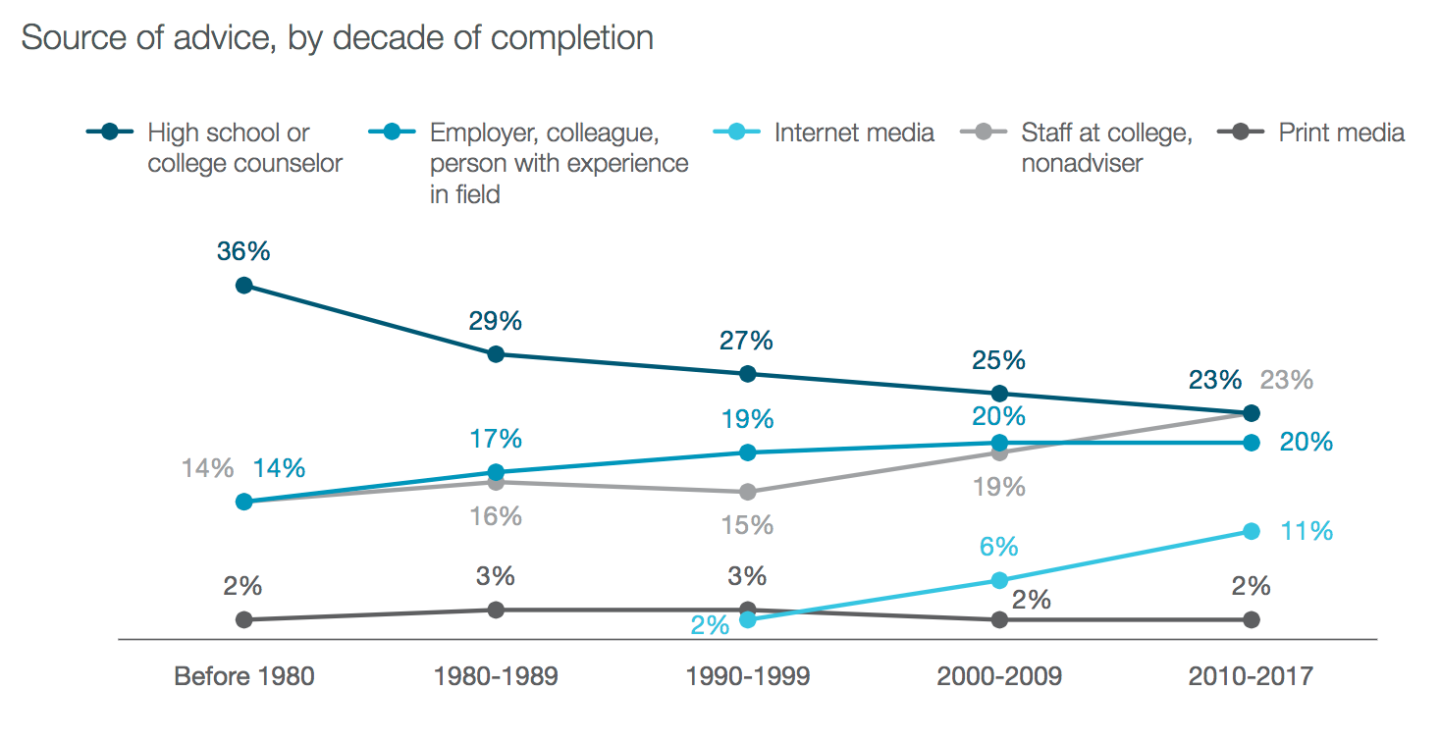Major Influence

Summary
The results highlight how learners seek advice from a wide variety of people and places, though the perceived helpfulness of that advice differs by its source and people’s experiences. The insights offered in this report suggest waStudents’ chosen fields of study have important implications for their livelihoods, but little is known about how and why students choose their majors. Prior research suggests that personal interest, personality, career prospects, academic preparation and parental influence are important factors that shape what people choose to study.However, limited research exists on how exposure to social networks, advice and different work experiences affect a person’s decision to pursue a given field of study, and how this exposure differs across groups of people.
This report explores one aspect of how individual choose their field to study – which sources provide advice to students and how helpful students perceive that advice to be.

Most people receive advice about their major from informal social network sources like family members and friends.
Informal social networks have consistently been the most common source of advice for individuals, regardless of the decade during which they were enrolled.
First-generation college students and students who are pursuing a two-year degree are less likely than others to get advice about their major from their informal social network. Older enrollees are more likely than younger enrollees to consult work-based sources of advice about their major.
Informal work-based sources of advice were rated most helpful, and those learners mentioning them would be less likely to choose another major if they had to start again.
First-generation students are expecially likely to rate advice about their major as helpful and rate advice from work-based sources as most helpful of all.
The results highlight how learners seek advice from a wide variety of people and places, though the perceived helpfulness of that advice differs by its source and people’s experiences. The insights offered in this report suggest ways postsecondary leaders, policy makers, educators and employers can equip students to be better-informed when choosing a field of study by widening their exposure to different types of information and advice.
When choosing a major field of study, individuals most commonly sought advice from their informal social network. In fact, more than half of adults (55%) with an associate degree, some college or a bachelor’s degree looked to their informal social network for advice about choosing a major field of study – most frequently from their friends (23%) and family (42%).

Though informal social networks have been the most common source across cohorts, the frequency of advice received from other sources has changed over time.
Individuals whose parents have gone to college have the advantage of leveraging their parents’ education experiences and are more likely to be exposed to other people who have gone to college. By comparison, those whose parents completed a high school diploma or less are far less likely to have received advice about their major from their informal social network.
Blacks and whites are similarly likely to have sought advice about their major from their informal social network. Asians are the most likely to mention their informal social network as a source of advice, and Hispanics are the least likely. Black and Hispanic adults are the most likely to have received advice from formal sources, and white adults are the least likely to have consulted formal sources. Women are more likely than men to consult formal sources of advice but slightly less likely to confer with their social network.

Many returning adults – those aged 30 or older at the time of their attendance – consulted different sources of advice about choosing a field of study, compared with younger enrollees. By comparison, younger attendees are more likely to have received advice about fields of study from their informal social network.
When it comes to choosing a field of study, the most helpful advice comes from work-based sources.
First generation students are more likely than those with a parent who has a college degree to regard advice about their major as helpful. This perhaps reflects the fact that their informal social networks may have less exposure or experience with postsecondary education.































